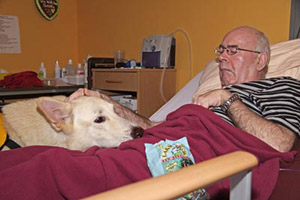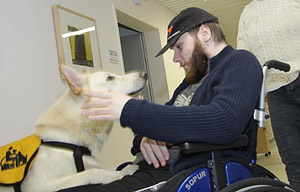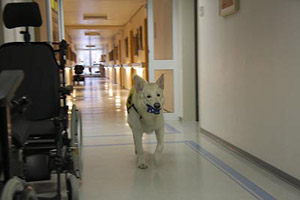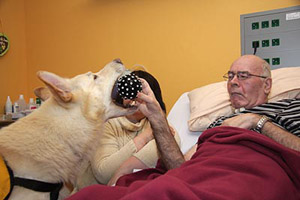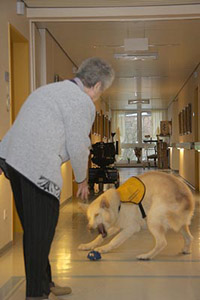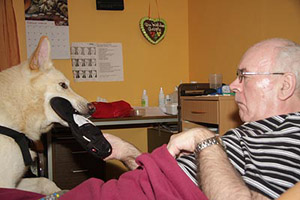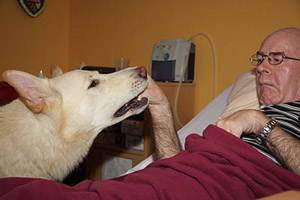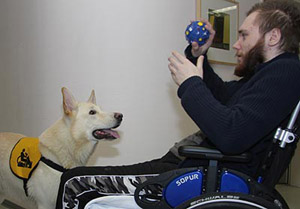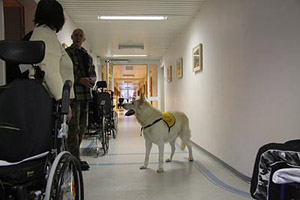Karhus "promotion" - Working with people in persistant vegetative state (PVS)

It was a quite strange feeling when I opened the glass door leading to the PVS rooms of the home for aged and handicapped people. Karhu and I, meanwhile a wellknown and welcome team, started to a new chapter in our therapy work. I put my hand on Karhus coat, his reaction was an irritated look up to my face. "What's wrong?", he seemed to ask. "Everything's ok", I answered.
"It is not necessary to whisper. We are all happy when nice people - and doggies - come for a visit", I was told. A short talk to the doctor and the nurse, then we opened the first door.
This "adventure" started with a meeting between the homes' leader and me. The home leadership planned some rooms for people in persistant vegetative state. It needs special presupposes and authorizations but first of all, they asked me whether I could 'work' with Karhu in this part. Of course, they knew us quite well, after 5 years regular visits. But PVS ... Somebody, who seems to sleep for ages and the target to bring this man or woman back to life. A target that will stay a dream in most cases. I sat at the table, unable to move, thinking about my answer. Karhu, cool as always, on the floor, starring at the goodies on the table. A strange feeling ... will I be able to come along with this situation? Will Karhu be able to work with this kind of people? It was my part to answer, the leader would accept a "no", he told me. I asked for some time. I needed more information - about coma, about dogs working in this part.
The evening and the next day I spent by surfing and looking for information. Soon, I got a contact by 'my' club "Tiere helfen Menschen". All active members are honorary working in different parts (prisons, hospitals, schools...). Perhaps one of them does already something similar. And there was somebody - long telephone calls taking away lots of illusions but also giving lots of important information.
Half a year passed by. The leadership of the home changed and I was still working with the aged people. Because of the death of Karhus most loved man our work became a bit boring. This man had always been there when Karhu came and he loved to work with him. Karhu and he became a good team: Karhu took goodies from his head, he nearly jumped into the wheel-chair, he trew the wheel-chair though the floors and played a kind of frisbee outside in summer. His death changed a lot, Karhu missed him, he looked for him each time we went to the home. Anyway, undoubless Karhu gave some special highlight to his life. And this is why we are doing this job.
We had to reorganize or work. Finding new people ... sometimes nobody was interested and we drove home without any playing. The program in this home offers so many things that often enough all people were playing bingo, singing or something else. A disadvantage of my "come whenever you want".
Then one visit changed everything. I had planned a short stay, Karhu was playing in the entrance area when the leader came to us. The PVS rooms were ready and the first people had moved. Furthermore, the dement people had asked for visits. Some minutes later - without being able to think much longer about it - Karhu and I stood in front of the glass door in the first floor. Now I took profit from all the things I had learnt in the summer.
A big black spider on the arm ...
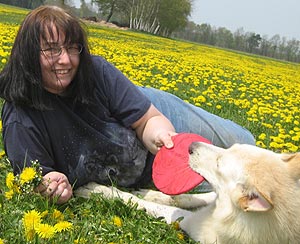
People, living in this part, have passed a long time in hospitals and special clinics. There are different phases from A to F. A means an acute state of PVS. These people usually are in hospital in intensive care. The people in this home are in phase "F", they are in PVS state for a longer time, sometimes already for many years and the hope is very small that they might be able to return to a normal life. The longer the PVS state lasts the less are the chances that these people will recover. They get help by physiotherapy, ergotherapy, smell therapies ... yes ... and from Karhu. There are different messages about their feelings and it is a subject that is still discussed. However, probably these people realize their situation, their environment and what happens around quite well. They simply have lost the ability to move, to speak (dependent on the part of brain damaged), the minimal signs they can give must be enough for nurses, relatives and visitors to realize what they want to say.
The club member working with coma people already pointed out on the phone that we have a big responsibility. Just imagine, somebody puts a big spider on your arm, you realize, she is walking up to your shoulder. You are scared to death but you cannot cry, you cannot tell that the situation is awful and fightened for you. A coma patient with a dog phobie or even a fear of dogs will be scared when a big dog enters the room. 'Just try!', is an absolute wrong way.
It is our responsibility to leave the dog only in when we exactly know that this person had a good relationship to dogs. The nearer and more intensive he had contact in his "former" life, the better chance our dog has to get contact.
Expectations - Hopes - Disappointments
A person who finds back to life because of our dogs' visit, this is a miracle. This will probably never happen.
A person who shows a reaction, who shows in some way that he likes the visit, this could become real. Not always, but perhaps..
Numerous visits in rooms whose people are starring at the ceiling. Doubts that they realize you are here: this will happen quite often.
"You must be quite courageous to enter this floor", I was told. "I have the chance to decide", I answered. "these people - and their relatives - did not have this chance."
My visits have some more details. Realtives, partners, children and friends, they hope for years. They see every small change in behavement. People, visiting their partner daily, for years and years, giving up a big deal of their own lifes. For their loved partner who -perhaps- realizes their visit. They all are looking to the dog with a hope and an expectation, he can never ever fulfil.
Disappointments are happening much more often than miracles.
Time stands still ... experiences
A light and friendly room, coloured in yellow and orange. A thin curtain blowing in the wind, you can smell the spring through the open window. The TV is on. On the right at the wall a paper with the favourite programs. First impressions. A very private and familiar enviornment, perhaps destroyed by Karhu and me. Is it allowed to enter? We will never know.
The nurse puts up the ladies head. She starts coughing awfull. A short word to Karhu and we are leaving the room. Shocked, irritated. Was it a fault to enter?
"It's okay", the nurse stated. "Today she had a lot of dates. Each visit means a lot of mental work for these people. I think it was too much. In any case she is not afraid of dogs. She had no dog of her own but some cats. " I am not quite sure and will leave Karhu in front of the door next time.
The next room looks similar. Karhu waits in front of the (open) door. We are explaining who we are, who Karhu is. The nurse tells me that this lady had some boxers. I told that Karhu is a shepherd but a special one because he is white. 'Do you want to see him?' I ask her. She is still starring at the ceiling. No reaction. The nurse says "ok" and leaves the room. Well, simply perfect.... Karhu enters the room, looks at me, gets no information and starts looking around. He realizes the ball on my knees. KArhu and I start playing an bit, I put the ball on the bed. Karhu looks at the lady. A new situation, the confrontation with a person who shows absolutely no reaction. He is irritated, looks at me. 'Help', he seems to say. 'Do, whatever you want', I try to tell him. Karhu sits still and starts squeeking, jawning. Instinctively, he tries to get the attention. And he is successful: the head turns a bit, her eyes seem to see Karhu. The lips seem to say a word.
"You like it, don't you?" - I was so fascinated, I did not realize the nurse entering the room. "Take it - careful!" Karhu jumps with two legs on my leg and takes the ball from the bed. The lady still looks at Karhu. We repeat it some times, then she shuts her eyes. The nurse whispers: "It's enough now."
"You are quite welcome in this room", she says and that this lady can show a "NO!" quite clear.
In the third and last room I survived a surprise. A man, looking at me and realizing that I am there. Karhu runs to the bed and puts down the ball. I put the ball into his hand. The man raises the hand. Karhus reaction is prompt and I have to stop him by a handsign. I do not want the dog to jump into the bed! Not on his first day! The nurse smiles at me. I hesitate to give Karhu to ok. "Life can be dangerous", answers the nurse as I told that Karhu somestimes seems to have piranha-genes. But Karhu puts a paw on the bed. When his nose approaches the ball, the patient takes his hand (and the ball) away, no longer reachable for Karhu. Karhu runs to the other side of the bed. The hand moves into the opposite direction. Karhu understands the game, once again he jumps with one front paw on the bed, gets a little piece of the ball and pulls. Hard to breath in this situation, I am standing, prepared to interrupt at once. But millimeter for millimetre Karhu divides the ball from the hand by pulling. I never saw him acting that careful. He CAN do this work, he actually HAS this special feeling for the situation and people. Again and again he repeats this game with the man - until he closes his eyes. Tired. But happy.
Some times later I am sitting with some people of the staff in another room. Karhu lies on his side, sleeping and dreaming. We agree that we have to continue these visitss.
Meanwhile months have passed. The reaction of "our" first patient was probably really caused by a hard day, the next time she accepted Karhus visit without any sign of excitement.
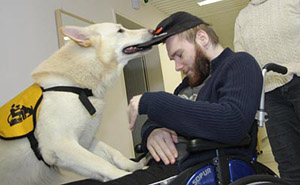
I would like to tell you about one visit to show the importance of good trained and absolutely friendly dogs. It is very necessary to test the dogs before a team starts to such visits.
The patients are not necessarily in bed. One of them sat in a wheelchair at the window, with a very small chink between bed and wheel-chair. The chink was wide enough for Karhu. The man took the ball at once, put him on his legs .... slowly it rolled down to the feet. It needed some coordination for this movement, I knew this was quite extraordinary for this man. I sent my daughter Malin out to look for the nurse, the teamwork between the man and Karhu was quite unbelievable. I did not think about Karhus reaction. He was irritated (something wellknown leaves), but he soon came back to the man and continued playing. It happened when Malin came back: Karhu tried to run to Malin, had to pass the chink. The patient reacted fast: the hand cramped in Karhus neck. Karhu stood still, looked at me. He yawned, he moaned, it was obviously quite painful for him. I put he arm around him and tried to take the fingers out of his coad. It was a kind of spasm, it was very hard to get the hand off. One finger after another, it took so long. As soon as Karhu was free, he ran to Malin. She told him to be the best dog of the world and started laughing. Now the hand cramped around my arm and I got an impression about the pain Karhu must have felt. Some minutes later the nurse came and Karhu demonstrated once again his game with this man.
An alike situation is simulated in the clubs (Tiere helfen Menschen) test. When Karhu had to pass I thought that this is quite difficult for a dog. Now I am thinking different. A therapy and also a compagnion dog must be able to accept even painful situations caused by a strange person. He never ever is allowed to show an aggresive reaction. Which underlines the confidence to their team partner as well as a friendly and harmless temperament.
Meanwhile we have four patients in the PVS area. The visits are always very different, also depending on the PVS state they are in. Sometimes all of them are sleeping. Then we come back to the "old" ways in the home or we are visiting the dement area.
I have learnt a lot during the past months. I did not know a lot about PVS before, thought about people, being in bed the whole day starring at the feeling and not able to react in any way. This is completely wrong and it is sometimes difficult to accept this knowledge. Literature and own experiences (as far as I can talk about experiences after such a short time) I am sure that these people know where they are, they know what is happening around but they have lost lot of the ability to communicate. "They see and feel more than we can imagine", I read on an internet site and yes, I agree. What a destiny - not to be able to express emotions by talking or movements. Even for the relatives, sitting beside a loved person for hours and hours for days, months and years. I have met some relatives who had to change their lifes - for a hope only.
Each time I am on "Station IV" I am concnerned. And I am sorry we cannot help more.
Two years later ....
Two years have passed by since we first went through the glass door. These visits are still something special, I never know what happens. But meanwhile I see some things quite different. So many things in everyday life make us upset and angry ... and here you realize how fast life can change into something completely different and those "big" problems are replaced by really big problems. Many times I felt small compared with the power and will these patients and their relatives need and have. You realize that relatives and partners often have hopes .... they hope the dog may change something and deep inside they know this wish will not come true. These people are so warmhearted, so friendly even though life is treating them that hard. I am glad for this experience, this knowledge and I nevertheless I am so happy to have a healthy family.
One patient is very special to me. The poster at his wall showing his cat inspirated us to present "Miss Marple" to him. A try, crazy enough: cats are no dogs, they are not used to follow. I asked the nurse, she grinned and accepted my idea. The first visit was very special. Miss Marple, grown up for the first 6 weeks on a farm, meanwhile nearly one year old, changed from a wild and playing young cat to a calm and satisfied cat. She lay down on the patients' knees. Miss Marple, quite shy to strangers, accepted the hands touching her coat - she even liked it. Whenever it is possible, Miss Marple comes with us and we can be sure, she jumps on the bed and enjoys the attention she gets. Something she never does at home.
Both, Miss Marple and Karhu belong to the PVS station meanwhile. Sometimes it is difficult to reach this door, because we have to pass some other floors with aged people. Whenever Karhu barks or squeeks the doors are opening for him. The joy and the bright eyes, when the aged people see Karhu, is the best possible loan for our work.
For our new book about white shepherds we got the permission to take and to publish some photos. It is always quite difficult to get these permissions, so we are glad and proud to be able to show some impressions of our work. The photos have been taken in February 2010 by Peter. F
Copyright: Gaby von Döllen, Worpswede (2010)
